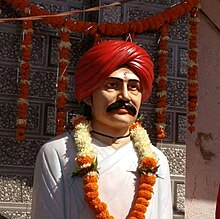Raghojirao Ramjirao Bhangre also spell Bhangaria (8 November 1805 – 2 May 1848) was an Indian revolutionary who challenged and defied the British power in Maharashtra. He was the son of Ramji Bhangre, a Koli who also resisted the British rule and was subsequently hanged in Cellular Jail.[1][2][3][4] he was only ten years old when he took up arms against British rule in Maharashtra.[5]
Naik Raghojirao Ramjirao Bhangre Patil of Devgaon | |
|---|---|
 | |
| Born | Raghoji 8 November 1805 |
| Died | 2 May 1848 (aged 42) |
| Cause of death | Hanged |
| Burial place | Umbhrai |
| Other names | Raghuji, Raghojee |
| Occupation | Patil of Devgaon |
| Era | British era |
| Organization | Bandkari |
| Title |
|
| Predecessor | Ramjirao Manajirao Bhangre |
| Movement | Indian independence movement |
| Family | Bapuji Bhangare (brother) |

Death
editOn 2 May 1848, Bangre was caught by Lieutenant-General Gell and hanged.[6][7]
Tribute
editIn 2014, The Chief minister of Maharashtra, Prithviraj Chavan inaugurated a Circuit House in Thane named after Raghoji.[8]
See also
editReferences
edit- ^ ढोमणे, सौ शिल्पा (21 April 2016). Veer Raghoji Bhangre / Nachiket Prakashan: वीर राघोजी भांगरे (in Marathi). Nachiket Prakashan.
- ^ "Adivasis celebrate and demand of basic amenities on 'World Indigenous Day'". Mumbai Live. Retrieved 7 April 2019.
- ^ "राघोजी भांगरे यांचा लढा भावी पिढीला प्रेरणादायी". Maharashtra Times (in Marathi). 4 May 2014. Retrieved 7 April 2019.
- ^ Guha, Sumit (2 November 2006). Environment and Ethnicity in India, 1200-1991. Cambridge University Press. ISBN 9780521028707.
- ^ Hardiman, David; Hardiman, Professor of History David (1996). Feeding the Baniya: Peasants and Usurers in Western India. New Delhi, India: Oxford University Press. p. 226. ISBN 978-0-19-563956-8.
- ^ Keer, Dhananjay (1997). Mahatma Jotirao Phooley: Father of the Indian Social Revolution. Popular Prakashan. ISBN 9788171540662.
- ^ Kennedy, Michael (1985). The Criminal Classes in India. Mittal Publications.
- ^ "Uddhav distances himself from Saamana edit against Gujaratis". The Indian Express. 3 May 2014. Retrieved 7 April 2019.
Further reading
edit- Krishan, Shri (7 April 2005). Political Mobilization and Identity in Western India, 1934-47. New Delhi: SAGE Publishing India. ISBN 9789352803071.